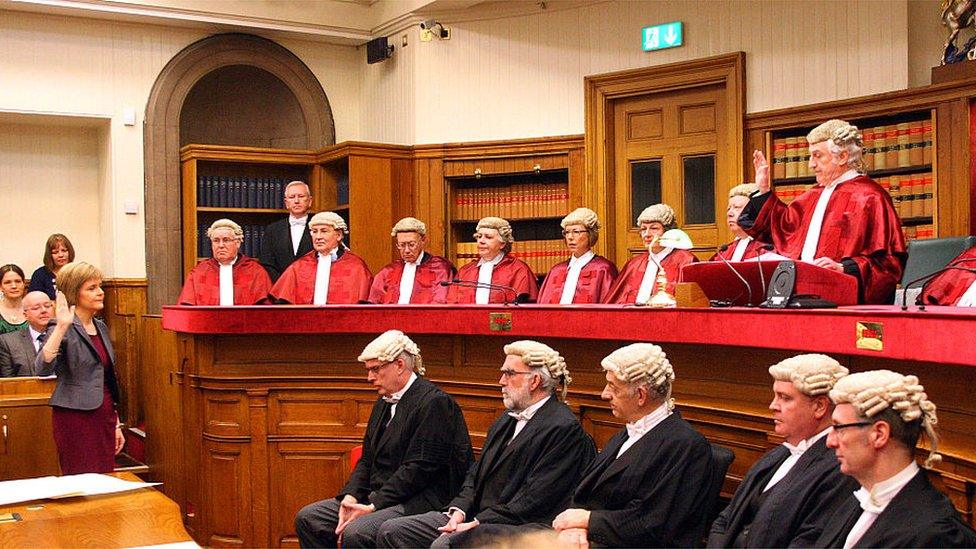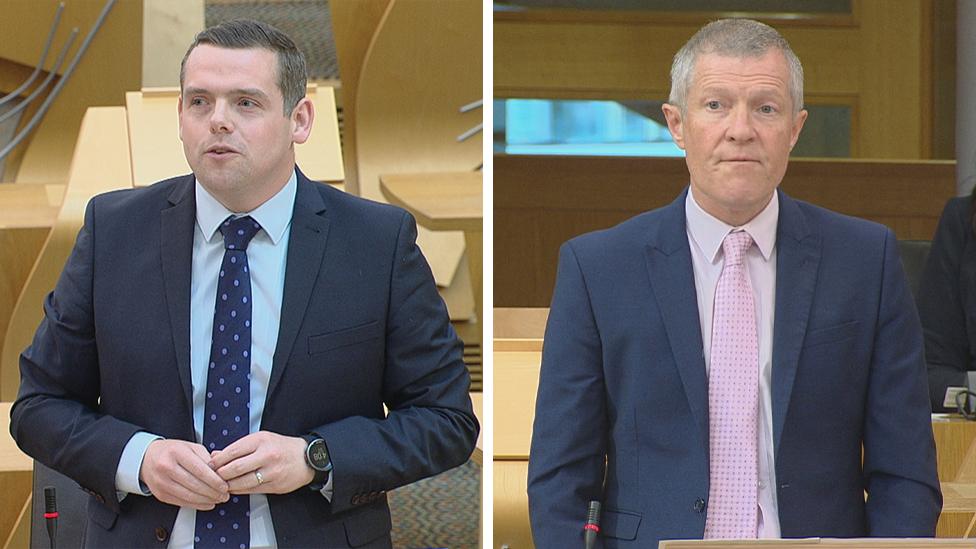Nicola Sturgeon re-elected as Scotland's first minister
- Published
Ms Sturgeon's SNP won 64 of the parliament's 129 MSPs in the election on 6 May
The Scottish Parliament has formally voted for Nicola Sturgeon to continue as first minister following the SNP's election victory.
Ms Sturgeon's party won 64 of the 129 seats - one short of a majority - in the election on 6 May.
This was easily enough for her to defeat both Conservative leader Douglas Ross and Lib Dem leader Willie Rennie in the first ministerial election.
Labour and the Greens both abstained in the vote.
Ms Sturgeon won 64 votes, ahead of Mr Ross on 31, with four votes for Mr Rennie and 28 MSPs abstaining.
Ms Sturgeon's nomination will now go forward to the Queen for approval, before she is sworn in at the Court of Session on Wednesday.
She told MSPs that the role of first minister was an "immense privilege but also an enormous responsibility".
Ms Sturgeon has been a member of the Scottish government since 2007, and will become Scotland's longest-serving first minister in 2022.
She said her "first and driving priority" would be to lead Scotland through the Covid-19 pandemic and into recovery for the economy, the health service and society.
To that end, she has been invited to take part in a recovery summit with Prime Minister Boris Johnson and Welsh First Minister Mark Drakeford.
However the SNP leader has also signalled her intention to push for a second referendum on Scottish independence later in the five-year term of parliament.
She told MSPs that this was part of "the debate all countries must have about how we can build the best possible post-pandemic future".
But she acknowledged that opinion on whether Scotland should be independent was evenly balanced, and insisted those who want the country to remain in the UK "mustn't feel as if you are being bludgeoned towards an outcome you have not been persuaded of".
She added: "Everyone in Scotland deserves to have an equal say - Scotland's future must be Scotland's choice."

Ms Sturgeon was first sworn in as first minister at the Court of Session in 2014
Mr Ross said he had grown up wanting to be a dairy farmer, and "simply would not have believed" he would one day be a candidate for first minister after achieving that goal.
He added: "I know there is literally more chance of one of my cows fulfilling the nursery rhyme of jumping over the moon than there is of me winning this vote today, but that doesn't mean we can't try."
The Conservative leader said his party was "aspiring to govern" and that he was standing for first minister "as a marker of our ambition not only for our party but for Scotland".
Mr Rennie also said he was standing with a "liberal dose of realism" about his chances.
He added: "No single party has a majority - nobody should assume the right to this office. Most people didn't vote for the largest party, so it's important their voice is heard today."
'Credible alternative'
Labour leader Anas Sarwar did not put his name forward as a candidate for first minister, but said he was "honest about my ambition for my party and for Scotland".
He said he was "not interested in just opposing", but wanted to "build a credible alterative" to the SNP.
Meanwhile Green co-leader Lorna Slater called for cross-party working on issues such as housing, education and climate change.
She said: "I am hoping the first minister and everyone in this room will consider the nature of the multiple crises that we face, and will commit to working in the spirit of cooperation and constructively across party lines."

Douglas Ross and Willie Rennie both put their names forward, but were backed only by members of their own parties
One of Ms Sturgeon's first tasks will be to reshuffle her cabinet, with several key ministerial posts vacant following the election.
Health Secretary Jeane Freeman, Constitution Secretary Mike Russell, Environment Secretary Roseanna Cunningham and Communities Secretary Aileen Campbell all retired from parliament, while energy minister Paul Wheelhouse lost his seat.
The ministerial portfolios are also set to be changed, with the SNP announcing plans to create a new post of cabinet secretary for net-zero, energy and transport, as well as a "minister for just transition" and another for youth employment.
The party's blueprint for the first 100 days, external of the new parliament also includes the establishment of a cross-party steering group on Covid recovery and the first steps to set up a public inquiry to learn lessons from the pandemic.
The current coronavirus legislation - introduced in emergency sessions at the outset of the pandemic - will also be replaced.
Ms Sturgeon has also pledged to begin consultations on the creation of a National Care Service, with a view to introducing legislation during the first year of the new term.
She told MSPs: "There is much to be getting on with, and this will be a government of action."

POSTCODE SEARCH: What are the results in your area?
ANALYSIS: The two key themes from these elections
INDEPENDENCE: What do the results mean for the Union?
